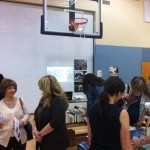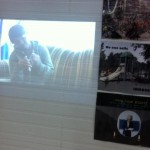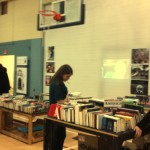Written by Eric and Robin
When supporting digital skills for grassroots organizations, partnerships between different types of organizations can create more than the sum its parts. For this workshop, the Digital Literacy Project collaborated with Concordia’s Mobile Media Lab to support Ressources ethnoculturelles contre l’abus envers les aînéEs (RECAA) with a digital skills building and video workshop.
Last fall, Eric was introduced to Anne Caines by Alannah Murphy of the Community Learning Center at James Lyng High School. Anne is the coordinator of RECAA. As an organization, RECAA does workshops for ethnocultural communities in Montreal which involve the performance of silent theatre pieces. These workshops promote a culture of respect and engage those communities in dialogue about elder abuse.
It was easy to find multiple areas for collaboration and we were excited to help this group explore video.
Around the same time, Eric was introduced to Dr. Kim Sawchuk of Concordia’s Communications Department by former Digital Literacy Coordinator Arwen Fleming.
All the ingredients were coming together to make a dynamic collaboration.
Through this partnership between RECAA, the Digital Literacy Project of the Atwater Library and Computer Centre and Concordia University’s Mobile Media Lab, members of RECAA spent this past season building their organization’s digital assets and exploring media production. In the process of this collaboration, many ideas were tabled and the group had many opportunities to try out practical techniques and explore the theoretical ideas surrounding the making your own media. As a group, they were very motivated to integrate these skills into the overall vision of the group.
Could the group use a video representation of the wordless theatre via video conferencing to do outreach to communities that they could not physically go?
What other ways could media be used to promote a culture of respect and to promote an awareness of elder abuse?
The session, animated by Concordia Masters student and Digital Literacy Project facilitator Sophie Guerin, was largely focused on filming and editing a video to be used as a promotional tool and to spread awareness about elder abuse.
Sophie Guerin notes,
“That’s what video is supposed to be used for, to transmit an important message to a wider audience. The RECAA people understood it right away. They really enjoyed the workshops and recognized that technology could be used to raise awareness against elder abuse. When the video was done, for the first time, they were looking at their own work on the screen. This video was a lot of effort for them much like the effort that is necessary when working with any social cause. When we see the result at the end, it is something we are always proud of.”
Additional aspects to the session have included using a blog platform to conduct outreach, as well as image scanning and creating slideshow presentations facilitated by Digital Literacy Project facilitator Robin Kelley. The video and slideshow were produced in time for screening at the International Elder Abuse Awareness Day event that RECAA organized.
Anne elaborates,
“We did not think that digital images could do justice to the personal connections that we made in our theatre workshops. This has been a more than educational experience. In coming together to record our work digitally, to present it on a screen we have re- discovered RECAA and renewed our commitment to work on a subject that is truly difficult and disturbing. It has re-energized each of us in very surprising ways. Some of us never thought we could feel that the computer was an ally and not an alien and unfriendly media for elder people.”
In our experience the practice of using digital media often leads to benefits that we had not anticipated. Early on in our session RECAA members discovered an exciting and unplanned use for the video skills they were learning – using video to document their theatre performances and practice sessions, both as an active tool for improvement and for archival purposes. Recording their practice sessions allows the actors to view the skit from multiple vantage points and immediately make improvements. It also allows them to save a visual documentation of pieces that they may not use any longer and develops their archive. An added benefit of this is a digital archive that preserves the organization’s long-term memory.
Robin Kelley notes,
“It’s always an exciting moment for us when we get to see a group find new, unintended uses for the tools they’re learning about. It means that the participants are taking it to the next level – that from our work together they’ve recognized the potential opportunities these tools offer – and they are going for it!”
Collaborating with different groups in the community, especially different types of organisations can help pool resources, skills and perspectives. Our collaboration with RECAA and Concordia really shows how this can deepen everyone’s work.
Dr. Kim Sawchuk elaborates further,
“It has been a joy working with RECAA and with the DLP. There has been an exciting exchange of ideas and perspectives that generate more ideas every time we meet. RECAA are energetic, visionary -unstoppable- and real model for rethinking what we mean by “active ageing”. Talk about active! What makes this so fun, and serious at the same time, is that the MML, the DLP and RECAA share a basic set of values. We all start with the idea of community. We have a similar attitude towards technology, teaching and social justice. The MML is committed to participatory media research and this melds perfectly with RECAA’s approach to theatre. It is an inspiring collaboration, and true partnership.”
Check out the video “Talking About Elder Abuse” that the members of RECAA made in collaboration with the Digital Literacy Project and Concordia’s Mobile Media Lab.





 In February,
In February, 
